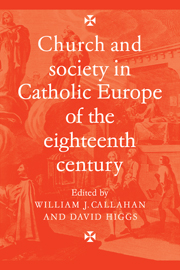Book contents
- Frontmatter
- Contents
- Preface
- Notes on contributors
- 1 Introduction
- 2 The French church
- 3 The Spanish church
- 4 The Portuguese church
- 5 The Italian churches
- 6 The German Reichskirche
- 7 The Austrian church
- 8 The Hungarian church
- 9 The Polish church
- 10 Popular religion in the eighteenth century
- Select bibliography
- Index
10 - Popular religion in the eighteenth century
Published online by Cambridge University Press: 05 November 2011
- Frontmatter
- Contents
- Preface
- Notes on contributors
- 1 Introduction
- 2 The French church
- 3 The Spanish church
- 4 The Portuguese church
- 5 The Italian churches
- 6 The German Reichskirche
- 7 The Austrian church
- 8 The Hungarian church
- 9 The Polish church
- 10 Popular religion in the eighteenth century
- Select bibliography
- Index
Summary
When an historical problem becomes fashionable, the historian must be especially cautious. In the flood of publications, conferences and debates appearing in recent years on popular religion, we have seen an extraordinary contribution of new materials and suggestions for research. But the subject sometimes risks being submerged in confusion. This essay intends to help clarify the issue by indicating promising directions for future enquiry.
The subject of popular religion imposes two preliminary contraints. The first is a problem of definition: what is meant by popular religion? The second is deciding on a clearly determined historical period, in this case, the eighteenth century, in a question which in many ways seems to defy time and delights in the idea of tradition or even ‘the immemorial’. Regardless of the ambiguities, I shall take a position on these basic points.
Popular religion: a problem of definition
The present collection of essays places the problem of popular religion in the context of Catholic Europe. Even accepting this judicious limitation, it is possible to consider the notion of popular religion in two very different senses, emphasizing either its social significance or its cultural content.
From the social point of view, the emphasis placed on the term ‘popular’ implies that the religion being studied is only part of a broader spectrum, a part, but in contrast to what? In the structure of the Catholic church one thinks of the distinction between clerics and laymen.
- Type
- Chapter
- Information
- Church and Society in Catholic Europe of the Eighteenth Century , pp. 138 - 154Publisher: Cambridge University PressPrint publication year: 1979
- 1
- Cited by



